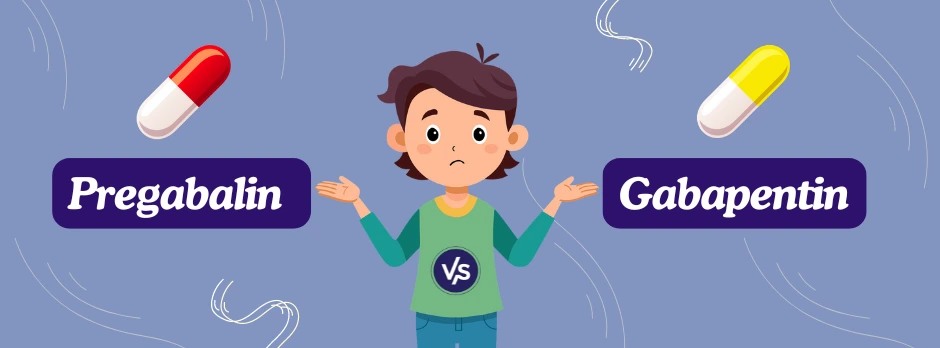Pregabalin Vs Gabapentin

Pregabalin versus Gabapentin: which one should you choose? That’s the question many individuals ask when deciding between these two medicines.
Pregabalin and Gabapentin are similar medications but differ in various distinct ways.
In this guide, we will highlight some of the similarities and differences between these effective medications so that you can make an informed decision.
Differences: Pregabalin vs Gabapentin
Gabapentin and Pregabalin are effective pain management solutions prescribed for nerve pain and seizures. Both these medications are classified as gabapentinoids, but there are some distinctions between the two medicines.
One of the primary distinctions between gabapentin and pregabalin is that the Food and Drug Administration has approved both drugs for some of the same uses but also different ones.
In the chart below, we have given the indications for which the FDA approves pregabalin and gabapentin [1]:
| Gabapentin | Pregabalin | |
| FDA Indications |
|
|
Doctors may also prescribe Pregabalin and Gabapentin for other uses besides the conditions specified by the FDA.
Off-label indications of these medications include –
- Panic disorder
- Generalized anxiety disorder
- Substance use disorder
- Migraine
- Post-traumatic stress disorder.
If you’re prescribed Pregabalin for its numerous uses, visit our category page Pregabalin Capsules, to explore one of the most popular brand versions of this medication, namely, Nervigesic.
Some other differences between Pregabalin and Gabapentin are –
- Gabapentin is a controlled substance (medications that can cause mental or physical dependence) only in some States, while Pregabalin is a Schedule V controlled substance (medications with a very low risk of abuse).
- Pregabalin starts working faster because it is absorbed more quickly than gabapentin.
- The common side effects of Pregabalin include dry mouth, blurred vision, headache, weight gain, indigestion, and constipation. At the same time, the common side effects of Gabapentin include – shaking, diarrhea, dizziness, drowsiness, and weakness.
- Pregabalin is available as an oral solution, capsule, and extended-release tablet. Gabapentin is available as a tablet, oral solution, capsule, and extended-release tablet.
- The half-life of Lyrica is 6.3 hours, and that of Gabapentin is 5-7 hours. The half-life of a medication is defined as the time required by a drug to be reduced to half of the original amount [2] [3].
Similarities: Gabapentin And Pregabalin

Some of the notable similarities between Gabapentin and Pregabalin are as follows –
- Both Gabapentin and Pregabalin have similar mechanisms of action. These medicines work by mimicking the effects of GABA (gamma-aminobutyric acid).
Gamma-aminobutyric acid is thought to have a calming effect and reduces the activity of the nerves in the brain, which is thought to slow down nerve signals involved in pain and seizures [1].
- Both Gabapentin and Pregabalin undergo renal excretion, which means they are removed from the body through the kidneys.
- Gabapentin and Pregabalin are dosed 2-3 times a day.
- They have similar drug interactions, including antidepressants, opioid pain medications, sleeping pills, sedatives, antihistamines, and tranquilizers.
- Sudden discontinuation of Lyrica and Gabapentin can cause withdrawal symptoms. Therefore, do not stop taking this medication without consulting a doctor.
- In rare cases, these two medicines can cause serious side effects, including allergic reactions with skin rash, hives, itching, swelling of the tongue, lips, and face, and difficulty breathing or swallowing.
- Some of the similar side effects of these medicines are drowsiness, blurred vision, dry mouth, vomiting, nausea, and dizziness.
Can You Take Pregabalin And Gabapentin Together?
No, combining Gabapentin and Pregabalin is not recommended as it can exaggerate side effects like drowsiness and dizziness and raise the risk of falls or accidents. It can also cause breathing problems in individuals [4].
Gabapentin And Lyrica – Effectiveness

Various clinical trials have examined whether Gabapentin or Pregabalin is more effective for treating specific conditions. Some of the research findings are explained below –
In a study by Philippa Delahoy et al. published in 2010, it was concluded that Pregabalin is likely to be more effective compared to Gabapentin for treating partial seizures in people with epilepsy.
However, in another study, it was shown that Pregabalin was not as effective as Gabapentin in reducing the frequency of seizures [5].
A review found no significant difference in the effectiveness of Gabapentin and Pregabalin for treating nerve pain after spinal cord injury [6].
Another research study by H. Karl Greenblatt et al, published in 2018, indicates that Pregabalin is effective and safe in treating generalized anxiety disorder, either alone or in combination with first-line pharmacotherapy (e.g., selective serotonin uptake inhibitor/serotonin-norepinephrine reuptake-inhibitor antidepressants).
The study also stated that Gabapentin could be a reasonable alternative to Pregabalin for the treatment of anxiety disorders, but the available evidence does not fully support this theory [7].
Pregabalin And Gabapentin – Warnings And Precautions
- Take the medicine as directed by your doctor. Do not take these medicines more often, and do not take them for a longer time than your doctor ordered.
- Both these medicines can be taken with or without food.
- In case of an overdose, seek immediate medical help.
Conclusion
Choosing between Pregabalin and Gabapentin should be guided by individual patient needs, tolerance, and the advice of a doctor. Each medicine offers unique benefits, and the best choice varies from person to person.
Disclaimer:
This is a generic Gabapentinoid manufactured in India. The original branded version received regulatory approval. All information is for informational purposes only. Consult your healthcare provider.
FAQs
Does gabapentin cause weight gain?
Is pregabalin a controlled substance?
Is pregabalin the same as gabapentin?
How long does it take for Lyrica to work?
Does caffeine affect Gabapentin?
References
- Pregabalin vs. Gabapentin: What's the Difference? very well health
- Pregabalin, NCBI
- Gabapentin, NCBI
- Pregabalin vs. Gabapentin: 7 Differences You Should Know About, GoodRx
- Adjunctive pregabalin vs gabapentin for focal seizures, NCBI
- Pregabalin and gabapentin in neuropathic pain management after spinal cord injury: a systematic review and meta-analysis, NCBI







